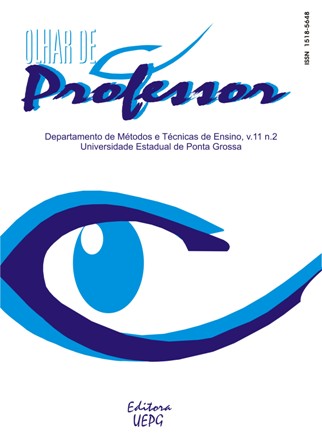A FORMAÇÃO DOS ALFABETIZADORES DAS CLASSES POPULARES: UMA EXPERIÊNCIA NO PROGRAMA BRASIL ALFABETIZADO (THE FORMATION OF LITERACY TEACHERS FOR THE POPULAR CLASSES: AN EXPERIENCE FROM THE LITERATE BRAZIL PROGRAM) -Doi:10.5212/OlharProfr.v.11i2.327338
Main Article Content
Abstract
Tecemos, no presente texto, uma análise dos desafios que emergiram durante a realização do curso de formação de alfabetizadores participantes do Programa Brasil Alfabetizado, realizado em São João do Piauí, município piauiense localizado na região do semi-árido do Estado. Entre esses desafios, destacamos a baixa escolaridade e a inexperiência da prática docente, no campo da Educação de Jovens Adultos, encontradas largamente entre os alfabetizadores do curso. Para construirmos nossa análise, definimos como objetivo principal investigar os limites e as possibilidades do Programa Brasil Alfabetizado em formar alfabetizadores capazes de alfabetizar jovens e adultos em suas comunidades. Trabalhando com atividades de rodas de leitura, produções escritas e registros orais e escritos das atividades vivenciadas durante o curso, pudemos resgatar a história de vida dos alfabetizadores e as memórias das experiências que perpassaram seu próprio processo de alfabetização, suas interações com a leitura e a escrita e com a escola. Considerando que todo projeto de formação não pode prescindir de uma concepção político-epistemológica que tenha como horizonte a constituição da identidade dos sujeitos alfabetizadores, tomamos como perspectiva as condições materiais de existência desses sujeitos, com o propósito de ver como essas condições materiais podem repercutir na construção das suas concepções sobre alfabetização e práticas alfabetizadoras, potencializando-os, nos seus movimentos de pensamento, a arguirem sobre as contradições/superações produzidas a partir do lugar histórico-social que ocupam na sociedade e das condições de exercício de sua própria cidadania.
Palavras-chave: Formação de Educadores. Educação de Jovens e Adultos. Alfabetização de Adultos.
This text discusses the challenges that emerged during the course for the formation of literacy teachers who participated in the Literate Brazil Program. The course took place in São João do Piauí – a city located in Piauí State, in the semi-arid part of Brazil. Among the challenges that most of the literacy teachers presented, we found a low degree of study and little experience in the practice of teaching in the field of Young Adult Education. The main objective of our analysis is to investigate the limits and the possibilities of the Program to train literacy teachers capable of educating adults and young people in their communities. Working with activities such as reading, writing, and verbal and written registers of the activities during the course, we were able to discover the life stories of the literacy teachers, and their own experiences in the literacy process: how they deal with reading, writing and schooling. Considering that no education project can exist without a political-epistemological vision to constitute the identity of the literacy teachers, we have focused on the material conditions of existence of these people, and how these conditions impact their vision of literacy and teaching practices. By so doing, we have enabled the literacy teachers to debate their own contradictions and victories emanating from their historical/social status in society, and their own conditions to exercise citizenship.
Keywords: Formation literacy teachers. Adult and young people’s education. Adult literacy.
Downloads
Article Details
Authors who publish in this journal agree with the following terms:
a) Authors keep the copyrights and concede the right of its first publication to the magazine. The work piece must be simultaneously licensed on the Creative Commons Attribution License which allows the paper sharing, and preserves both the author identity and the right of first publication to this magazine.
b) Authors are authorized to assume additional contracts separately, to not-exclusively distribution of the paper version published in this magazine (e.g.: publish in institutional repository or as a book chapter), with the author identity recognition and its first publication in this magazine.
c) Authors are permitted and stimulated to publish and distribute their papers online (e.g.: in institutional repository or on their personal webpage), considering it can generate productive alterations, as well as increase the impact and the quotations of the published paper.
d) This journal provides public access to all its content, as this allows a greater visibility and reach of published articles and reviews. For more information on this approach, visit the Public Knowledge Project, a project that developed this system to improve the academic and public quality of the research, distributing OJS as well as other software to support the publication system of public access to academic sources.
e) The names and e-mail addresses on this site will be used exclusively for the purposes of the journal and are not available for other purposes.

This work is licensed under a Creative Commons Attribution 4.0 International License.





